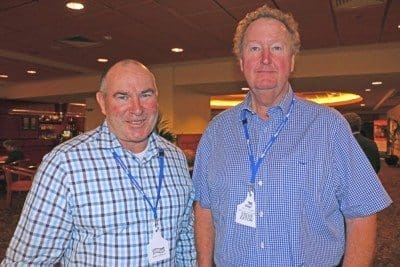SUPERMARKET giant Woolworths has returned to the traditional butcher shop model to win over customers in the retail beef war.
Old is new again as the company does a 180-degree turn from case-ready to in-store service butcher shops in 158 outlets over the past 12 months.
At the heart of the strategy is a third-party local beef brand in each state, Angus breeders were told at their annual conference yesterday.

Woolworths Meat Co’s Pat McEntee, left, catches up with Steve Exton, NSW DPI beef leader at Wagga, during the Angus Australia national conference at Albury yesterday
The transition has changed the way the company sells meat, according to Woolworths Meat Company director Pat McEntee.
“It gives our customers the best of both worlds… they can get their beef cut just the way they like it or engage in the shopping experience,’’ Mr McEntee said.
“But we will still have our self-service cabinets and case-ready product for our time-poor customers.’’
Woolworths has moved to using third-party beef brands, including Pure Black Angus in Victoria and Tasmania, Angus Pure in South Australia, Manning Valley in NSW/ACT and Central Highlands Farmers in Queensland, to differentiate the new service butcher shops from case-ready.
“Our strategy is to bring brands in front of our customers,’’ Mr McEntee said.
The company services more than 18 million customers across 967 stores each week, turning over 80,000 tonnes of beef, 46,000t of lamb, 23,000t of pork and enough sausages to circumnavigate the world 1.6 times.
Of those 967 Australian stores, about 360 feature traditional in-store meat production while more than 450 are case-ready.
The balance has transitioned to full-service butcher shops.
Mr McEntee was a key speaker at the Angus Australia national conference held in Albury yesterday (Friday, May 20).
He told delegates the Woolworths meat business was undergoing significant changes with a strategy to position beef as the first-choice protein.
He said price, quality and provenance of the beef were important to consumers.
“Historically, beef brands have been used to attract a premium,’’ he said. “More customers are looking to save on meat and protein as it becomes more expensive.
“The health of the consumer, animal and environment are also important as we position brands.’’
US supermarket beef brands are focused on provenance, and breeds to a lesser extent, as a point of difference to consumers, he said.
In the UK, the marketing focus has been on consumer health and wellness.
“One of the biggest changes retailers are grappling with today is the emergence of strong discounters,’’ Mr McEntee said.
He pointed to the use of farm brands by UK retailer, Tesco, to compete against global discounters at the lower end of the market.
“This is changing the way people look at supermarket brands. There are so many beef brands marketed right across Australia… and they are becoming more commonplace.
“There are a couple of farm brands directed at the lower end of the market. Customers can’t clearly articulate what a premium product is, or what a brand stands for.
“As we see retailers adopt brands, it becomes more difficult for customers every time they shop to determine if they are buying a premium product versus something positioned to compete.’’
Certification costs
Mr McEntee told Beef Central that Woolworths used its own internal certifications as well as the Pasturefed Cattle Assurance System (PCAS) certification on certain products.
He said the industry had a responsibility to ensure there were no unnecessary costs throughout the supply chain when it came to certification.
“All companies should have confidence in the standards and programs we have, and we all look to have objective third party certification to gives us that confidence,’’ he said.
“We all have responsibility around end-to-end costs right throughout the supply chain – it is about having a good program, confidence in that program, and being able to engender that trust back to consumers.’’
Mr McEntee said he welcomed the release of the Australian Beef Language white paper final report and looked forward to reviewing it.
The white paper examines the implications for the existing beef language in consumer demands, market access requirements, new processing and descriptive technologies, breeding and on-farm management.
“As long as we are making changes that are relevant to the customer – who is most important from my point of view in the industry – and all the players within the meat supply chain, then it should always be open for review and improvement,’’ Mr McEntee said.



I live in bowen north qld and the meat dept at the bowen store is a joke They have cakes in the meat fridge and practically no meat I will be going back to the local butcher where you can at least get what you want
As a former Woolworths butcher prior to retiring and having worked in quality butcher shops over the journey, I was appalled at the standard of cutting and presentation by Woolworths Meat Dept. staff.
It means absolutely nothing irrespective of the quality of the meat to be cut if the cutter is inept at his trade and I have witnessed quality beef bastardized by people who lack ability, knowledge and interest when they are cutting meat. If Woolworths are indeed reverting back to active Meat Departments and it would appear not all are included as my local store had all its meat preparation gear, saw, benches etc removed very recently – their first consideration is to obtain butchers who can prepare and cut meat to its potential. The remainder of the stuff our friend from Woolworths talks about, is secondary.
Central Highlands Farmers ………….. now there’s a short catchy brand ! Wish I had thought of that ! NOT.